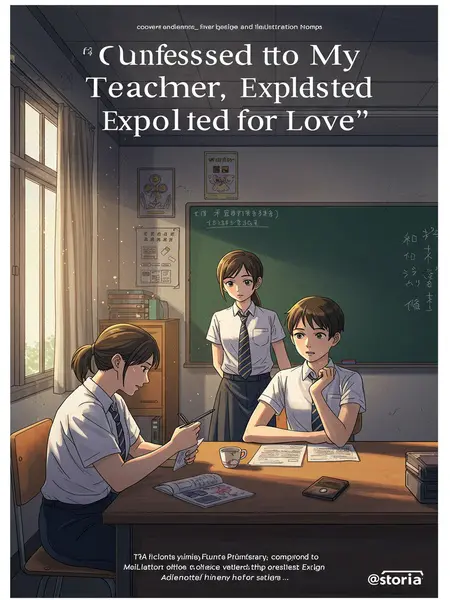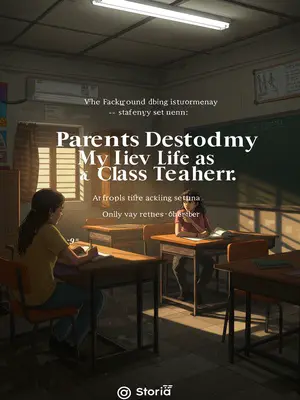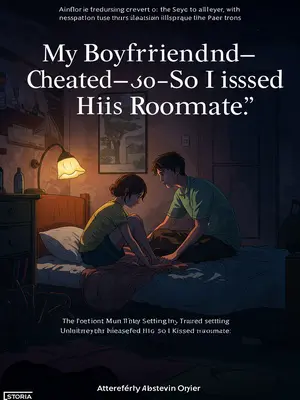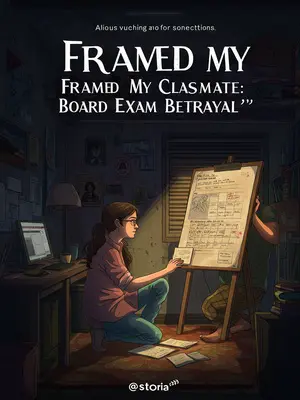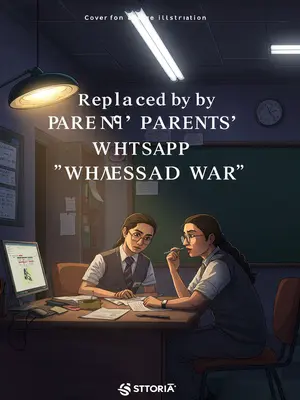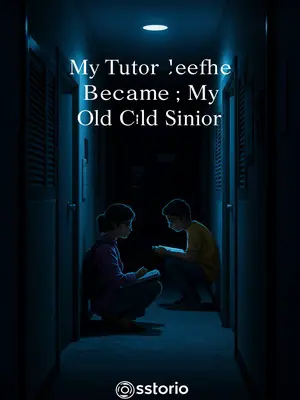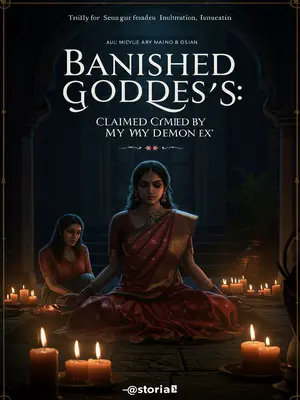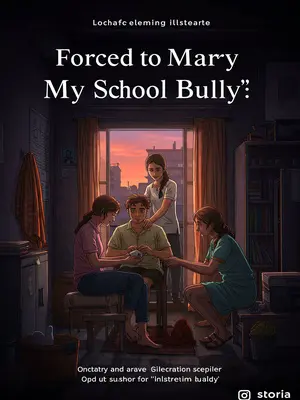Chapter 2: Confessions and Consequences
The teacher slammed her palm on the desk. "I take back what I said before. Looks like this girl isn’t very self-aware either—she’s just besharam! Listen up! If I catch any of you sharing lip balm, I’ll call your parents right away!"
The students tittered nervously, but the teacher’s tone was more for show, trying to restore her authority. Her knuckles whitened on the desk, and I thought I saw a faint blush behind her glasses. She avoided my eyes.
She nodded at my mother to continue.
My mother read, voice shaking: "So many years have passed, but I still can’t forget. To you, I’m just a passerby, but you changed my world."
Each word lingered in the air. My mother dabbed her eyes with her pallu, her voice barely steady. The students were transfixed, the world outside forgotten.
"I heard your marks are excellent, and you’ll get into a top university. But I’m different. Everyone says I always bunk class, my marks are poor, and I have no future. You’re a proper city girl; I’m just a small-town boy."
A faint breeze stirred the curtains. The distant ring of the temple bell drifted in. Even the pigeons seemed to pause, listening to a confession raw and real.
The teacher laughed, sharp but with a quiver. "Filmy dialogues! Girls, listen—boys always say these lines, put themselves down, praise the girl, then act all bechara for sympathy."
Some girls giggled, torn between amusement and curiosity. Someone whispered, "So filmi!" and covered her mouth.
All the girls nodded, leaning forward as if taking mental notes. This was real drama—better than any Shah Rukh Khan movie. I could feel their empathy and their need to gossip.
My mother, trembling, continued: "To keep up with you, I never bunked class again. I got up at two every morning to cook for my mother and prepare her medicines..."
Her voice nearly broke. She glanced at me, pride and sorrow mixing in her eyes. The scent of Vicks vaporub and the memory of watery dal returned to me, the hiss of the pressure cooker in the background.
The teacher’s expression softened. She fiddled with her dupatta, composure slipping for the first time. Some students frowned, sensing a shift.
"Wait, what do you mean by cooking and making medicine?" she asked, her tone gentler.
My mother wiped her tears and said softly, "Madam, when he was little, I was bedridden for a year. His father had to work, so he skipped class every day to come home early, cook, and make medicine for me. That’s why his marks suffered. Later, he started working hard again, getting up early to do chores—all to take care of me."
For a moment, even the worst gossips were silenced. My mother’s words cast a shadow over the laughter, replacing it with respect. The teacher’s eyes widened in realisation.
She let out an awkward 'oh', tucking her bangs behind her ear. "Continue reading. Did not expect this—a lovesick type, liked her since bachpan, kya?"
Her voice was gentler, her stance less rigid. Some students looked at me with something like awe. Even the backbenchers were silent now.
My mother read on: "Liking you is so hard, because you walk so far ahead, so high above. To meet you, I studied even harder, followed you to the best school in Lucknow, but I..."
Her voice quivered. I could see her remembering nights by the kerosene lamp, the taste of reheated tea. My father’s eyes glistened beside me.
The teacher interrupted: "Our school isn’t the best in Lucknow. See? Head full of love, missed the top school. Lesson, everyone—study hard, or you’ll even miss out on love!"
Her words, meant as scolding, now sounded almost wistful. A few boys chuckled nervously, the lesson clear. The bell for the next period rang, but no one moved.
My mother said softly, "Madam, the next line he wrote is: 'But I didn’t get in, yet I met you here.'"
A hush fell. The sense of fate—kismet—hung in the air. A few girls smiled, caught by the romance. The teacher’s jaw tightened.
Her face soured. She fiddled with the letter, eyes downcast. "Looks like that girl didn’t focus on studies either. Continue."
Her voice was nervous, but no one dared speak. My mother’s hands shook as she read on.
I noticed the faint embarrassment on the teacher’s face, her cheeks reddening—a detail not missed by the nosier students. Did she remember those days, or was she pretending?
She did get in, back then—I knew. I once thought I’d never see her again, but fate brought her back as my class teacher. There was something bittersweet in destiny’s plans.
My mother continued: "When you met me, you only smiled and nodded. I think you probably don’t remember the little boy who sat crying on the ground years ago."
Her voice trembled. The class held its breath.
The teacher exaggerated: "Arre, the crying little boy—so embarrassing! This filmy dialogue is something else. Why do you love crying so much?"
She rubbed her arms as if she really had goosebumps. Some girls giggled, breaking the tension. Even the strict maths teacher next door poked her head in, curious.
All the girls scratched their arms, grinning, sharing an odd camaraderie. The air felt lighter, the earlier shame replaced by warmth.
The teacher sneered, "Are you embarrassed and want to cry now, little crybaby?"
Her teasing had a soft edge. My cheeks burned, but I managed a shaky grin.
Watching her make faces, I thought—hai Ram, why is every move she makes so cute, just like a little girl? My embarrassment faded in the glow of those memories.
If my shame can bring her a little joy, I’m willing. Maybe that’s love—wanting her to smile, even at my own expense.
My mother continued: "That year, that day, my mother had surgery. The doctor said she might not wake up. I was terrified, so I cried helplessly."
Her voice broke. Some students looked away, respectful. The classroom felt like a temple.
"Wait."
The teacher interrupted, staring into my eyes. "You cried because of this?"
Her tone was gentle. The class leaned in, empathy replacing curiosity.
I nodded.
She turned and bowed deeply to my mother. "I’m truly sorry. I didn’t know. I sincerely apologise."
She joined her hands in a quick namaste, eyes shining. My mother nodded, forgiving her at once.
The girls who’d been laughing now looked down, faces red. The boys shuffled, subdued.
My mother wiped her tears and continued: "When I was little, I didn’t understand these feelings. When you kissed my forehead, it was a moment I’d never forget."
Her words floated, fragile as a diya flame. Sunlight slanted through the window, dust motes dancing in the golden light.
"But when I met you again, my heart pounded, everything else faded. Your smile moved in slow motion, etched in my mind."
Some students wiped their eyes, the story now a saga, not a scandal.
"I realised I really love you. From the day I met you, I knew my feelings ran deep."
My heart hammered. For the first time, I felt exposed, yet free.
"I’m glad I missed the best school in Lucknow by ten marks, so I could meet you sooner."
Her words were bittersweet. My father’s hand tightened on my shoulder. My mother’s voice, though shaky, held pride.
The teacher said coldly, "You did poorly. You should feel ashamed, not glad. Wait—"
Her sternness was forced. The class waited, breathless.
She realised something. "Did he really only miss the top school by ten marks?"
Collective intake of breath. My mother glanced at my father, who finally looked up.
He spoke, "Madam, meri galti hai. PE exam mein marks gaye. Main mazdoor hoon. Us din chhat se gir gaya. PE ke ek din pehle, beta mujhe doctor ke paas le gaya tha."
His voice was thick with emotion. The class listened, stunned.
The teacher asked, "Can you buy those ten marks?"
Her tone was gentle. Everyone knew the meaning—the price of opportunity.
"Dus mark ka daam—das hazaar rupaye. Hum nahi de sakte the. Mera beta bardasht nahi kar saka."
His voice cracked. Teachers gathered at the door, faces sombre. Even the principal paused outside.
The teacher fell silent. She paced on the dais, her sandals clicking, eyes lost in thought. The whole class watched, awkward and uncertain.
Finally, she said, "These are admirable qualities. So why risk your future for early romance?"
Her voice was softer, almost kind. She looked at my mother as a woman who understood loss.
My mother replied quickly, "Mera beta abhi athara ka ho gaya. Ek saal peeche raha, mujhe sambhalne ke liye."
Her voice was proud. Some girls smiled, impressed.
The teacher replied, "Even if he’s eighteen, still in school. Continue reading."
Her strictness returned, but with compassion.
My mother read: "These past years have been the happiest of my life. Every day in class, I look forward to seeing you, always watching you."
Her voice was barely a whisper. The words shimmered with hope and longing.
The teacher said sternly, "In class, eyes on the blackboard. Your eyes should be on me."
The irony wasn’t lost on anyone. My cheeks flushed.
I nodded. My gaze had always been on her. Even now, as I stood before everyone, the world faded when she was near.
